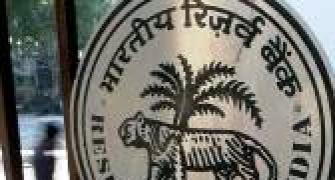 Sandesh Kirkire, CEO, Kotak Asset Management Company says RBI may hike rates and tighten liquidity.
Sandesh Kirkire, CEO, Kotak Asset Management Company says RBI may hike rates and tighten liquidity.
The Union budget for FY11 has been themed on the reintroduction of the fiscal prudence norms and freeing-up the demand factors for growth.
The fiscal deficit for FY11, pegged at 5.5 per cent, is a positive development, and reduces the net government borrowing pressure on the debt market.
Although, the net borrowing by the government (Rs 3,45,000 cr) may put some pressure in yields in the first half when you may see a supply of Rs 10,000-12000 crore of securities every week.
During the first half we may also see rise in policy rates and gradual tightening of liquidity by RBI. The inflation could also peak in the first half.
The broad equity markets do not have any risk on account of domestic factors and should deliver performance in line with the nominal GDP growth; with sectors depending on domestic consumption and investment, benefiting the most from the reversal.
The renewed fiscal discretion is to be managed by curtailing the total expenditure growth at 8.6 per cent; while the total non-borrowing receipts are projected to increase by 19.7 per cent.
Much of this increase in receipts is palpably projected to accrue from divestment, 3G auction proceeds, and revenue increase from excise duty and customs.
Further, the government is also targeting a fiscal deficit of 4.8% and 4.1% for FY12 and FY13.
This may improve India's sovereign standing in an increasingly uncertain international environment, and enhance the FDI and the FII flow prospects in the year ahead.
Additionally, the budget aims to supplement the demand impetus by increasing the capital expenditure allocation from Rs 1, 15,192 crs in FY10 to Rs 150,025 cr in FY11 - a yoy growth of 30.24%.
Moreover, the partial continuation of the stimulus package; and the upward re-evaluation of the income tax slab for individuals (which would provide an indirect pass back of around Rs 50,000) may provide a sizeable fillip to the aggregate demand in the economy.
At a more specific level, the clear guidance to implement the direct tax code by 1st April, 2011; as also the endeavor to implement the GST by the same time, is seen as a major tax guidance for future.
It is expected that, this implementation of the new tax regime may provide an incremental GDP growth of 1-2% in the years ahead.
From the financial industry perspective, the re-capitalization of the PSU banks, and the possibility of the new banks joining the sector, may increase the stability and the competitiveness of the banking industry.
Also, the government initiative to set-up an apex body - the Financial Stability and Development Council (FSDC) - is a pro-active move. The body may monitor the macro supervision of the economy, the functioning of the large financial conglomerates; and handle the inter-regulatory co-ordination issues.
This in-turn may strengthen and institutionalise the responsibility of maintaining financial stability in the system.
On a small flip side, the excise and customs duty hike may have an inflationary bearing on the economy. In that context, we may see an increased liquidity calibration through rate hike/OMO in the coming months by the RBI.
However, the overall impact of the budget is slated to be pro-growth and positive.








